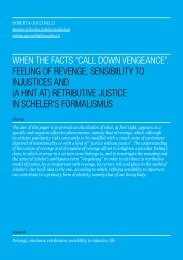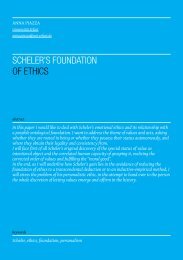the neosentimentalist argument against moral rationalism
the neosentimentalist argument against moral rationalism
the neosentimentalist argument against moral rationalism
You also want an ePaper? Increase the reach of your titles
YUMPU automatically turns print PDFs into web optimized ePapers that Google loves.
2.<br />
<strong>the</strong> neosentiMentalist aRGuMent aGainst MoRal RationalisM:<br />
soMe CRitiCal oBseRVations<br />
massimo reichlin università Vita-Salute San raffaele, milano<br />
haidt’s social intuitionist conception aims to show that <strong>moral</strong> judgments<br />
are caused, in <strong>the</strong> great majority of cases, by <strong>the</strong> bursting in of certain<br />
emotions, while <strong>the</strong> <strong>argument</strong>s offered in <strong>the</strong>ir favor are almost always ex<br />
post rationalizations, that is, clumsy attempts to give reasons to support our<br />
automatic responses: <strong>the</strong>se attempts are generated in <strong>the</strong> context of a social<br />
request of justification and have no causal or explanatory role in generating<br />
<strong>the</strong> judgments in <strong>the</strong> first place.<br />
this model seems to leave no space for altoge<strong>the</strong>r ordinary psychological<br />
processes, such as first-person solitary <strong>moral</strong> reflection and deliberation,<br />
and must consider all <strong>moral</strong> arguing as a lawyer’s attempt to defend a <strong>moral</strong><br />
truth that is simply accepted a priori. moreover, it seems unable to account<br />
for <strong>the</strong> empirical fact that controlled “cognitive” processes are effective<br />
in (sometimes) contrasting <strong>the</strong> emotive responses, overwriting rational<br />
responses based on consequentialist computations (greene et al. 2001, 2004<br />
e 2008). in o<strong>the</strong>r words, by making reason a complete “slave of <strong>the</strong> passions”,<br />
this emotivist view is in contrast with <strong>the</strong> empirical evidence that suggested<br />
<strong>the</strong> “dual-process model”.<br />
shaun nichols’ model of <strong>the</strong> sentimental rules offers a much more complex<br />
formulation of <strong>the</strong> <strong>neosentimentalist</strong> approach: it not only establishes <strong>the</strong><br />
disposition to feel certain emotive reactions, particularly with reference<br />
to o<strong>the</strong>rs’ sufferings, as <strong>the</strong> fundamental component of <strong>the</strong> <strong>moral</strong> capacity;<br />
it also stresses <strong>the</strong> importance of some normative perspective, that is, of a<br />
body of rules concerning <strong>the</strong> approval and disapproval of certain kinds of<br />
behavior (nichols 2002a, 2004, 2008).<br />
Building on <strong>the</strong> data from several psychological experiments, nichols argues<br />
for <strong>the</strong> following points: a) <strong>moral</strong>ity—and particularly <strong>the</strong> capacity to make<br />
core <strong>moral</strong> judgments (i.e., judgments that actions causing suffering to o<strong>the</strong>r<br />
people are wrong) and to distinguish between <strong>moral</strong> and conventional<br />
violations—is explained by <strong>the</strong> affective mechanism of concern; this accounts<br />
for <strong>the</strong> fact that three-year old children and autistic children are able to<br />
make core <strong>moral</strong> judgments while still lacking a developed <strong>the</strong>ory of mind;<br />
b) <strong>the</strong> importance of this emotive mechanism, coupled with <strong>the</strong> empirical<br />
data concerning psychopaths and people suffering from focal lesions of<br />
<strong>the</strong> ventromedial section of <strong>the</strong> prefrontal cortex, shows <strong>the</strong> implausibility<br />
of <strong>moral</strong> <strong>rationalism</strong>; c) <strong>the</strong> fact that psychopaths often display an intact<br />
capacity for <strong>moral</strong> judgment shows that knowledge of <strong>the</strong> sentimental rules<br />
can be dissociated from <strong>the</strong> emotive mechanism: moreover, subjects suffering<br />
165




